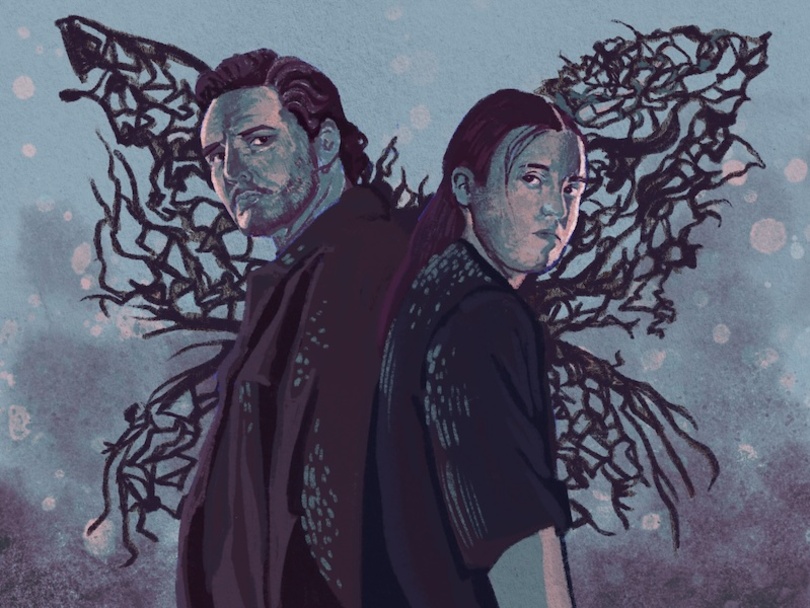‘The Last of Us’ examines cost of revenge in unfulfilling new season

Main characters Ellie and Joel spent much of Season 1 of “The Last of Us” developing a poignant father-daughter relationship. After Joel’s death at the beginning of Season 2, the plot focuses on Ellie’s journey for revenge. Hannah Mesa | Illustration Editor
Get the latest Syracuse news delivered right to your inbox.
Subscribe to our newsletter here.
Even if the path we take is out of the goodness of our hearts, there are always consequences to our actions. Despite the success of the first season, the second season of “The Last of Us” explores this theme with an overall unsatisfying and incomplete end.
“The Last of Us” takes place in a 2003 apocalyptic world. Cordyceps, a fungus, has turned humans into zombie-like creatures called Clickers. With no cure, the world is left disparaged — until the Fireflies, a revolutionary militant group, discover Ellie (Bella Ramsey), an immune teenager.
Joel (Pedro Pascal) is tasked with delivering Ellie to a Firefly hospital in Salt Lake City, Utah, to create a cure. Throughout their journey, the pair fend off Clickers while forming a father-daughter relationship.
Season 2 of “The Last of Us” picks up right where Season 1 left off. In the Season 1 finale, Joel murders 18 Fireflies after discovering Ellie had to die in order to make the cure. After losing his first daughter, Joel couldn’t lose another.
Following his massacre, Joel and Ellie head to Jackson, Wyoming, where Joel’s brother and a guarded community live. Ellie confronts Joel about his actions in the Season 1 finale, leading to lies between them.
Season 2, released in April of this year, takes a different approach than the show’s first season.
The world of “The Last of Us” is harsher and grittier than the first season. Protagonists and antagonists explore their moral compass as their loved ones’ lives are taken away. Though the change in narrative ushers in an opportunity to stand out from the previous season, it ultimately wound up as a disappointing and forgettable plot.
The story continues five years later — Joel and Ellie call Jackson their home. Joel has emerged as one of the community’s leaders while Ellie remains her angsty self, though it seems their relationship is strained.
Season 2 starts out strong with Joel’s gruesome death — a scene that replays in your head over and over again. Ramsey and Pascal’s acting prowess elevated Joel’s death. As Joel is at the brink of death, Abby’s (Kaitlyn Dever) team — a new central character to “The Last of Us” — holds Ellie back. Joel tries to reach out as Ellie pleads with him to get up before Abby murders him as revenge for her father’s death in Salt Lake City.
Even with his face bloodied and beaten to a pulp, Joel’s sheer determination to be with Ellie is exemplified by Pascal’s outstanding performance. The audience is rooting for him, even though we know what’s to come. The audio drops as Abby murders Joel, and all we see is Ellie painfully screaming as she watches her surrogate father die. This sequence is almost unbearable to watch, and Ramsey puts on one of their best performances yet.
Joel’s death mirrors the story structure that made Season 1 so popular, where a memorable character is killed in an emotional scene in each episode.
In the first season, viewers were introduced to new side characters, growing fond of them before they were killed off. This shock factor was lacking in Season 2. Though the main narrative of Season 2 is based on the video game and therefore can’t be changed much, the show does little to substitute this shock value that makes “The Last of Us” so gripping.

Sophia Burke | Digital Design Director
Abby’s unwillingness to hold back makes Joel’s death all the more complicated. She was ruthless, but she had every right to be, as Joel had killed her father in the hospital in Season 1. Her ties to Joel and Ellie make this narrative complex yet worthwhile, setting up the rest of Season 2 to be promising as Ellie seeks revenge. Instead, it was a disappointment.
While each episode of the first season of “The Last of Us” felt distinguished in its own way, the second season fails to live up to its predecessor. It was more of a breeze-through rather than an immersive experience. The third episode onward felt amalgamated together, no thanks to the change in Ellie’s character.
In Season 1, we see Ellie’s unrelenting bravery as she deals with a painful past. We witness how far Ellie would go to avenge those she loves. That quality seems to be muted in Season 2. Each time Ellie hunts down Abby’s team, a moral dilemma holds her back. This unfortunate change takes away Ellie’s main qualities and similarities to Joel as a brave fighter.
The missing shock aspect and emotional content of Season 2 were most evident in the season finale. When Ellie arrives in the Seattle Aquarium, where Abby’s team is based, she only finds two team members, Owen (Spencer Lord) and Mel (Ariela Barer). After refusing to give Abby up, the two suspect Ellie is going to kill them. Owen picks up his gun, hoping to kill Ellie, but she shoots first, killing Owen and Mel with one shot.
The deaths of these two characters were to be expected and held no emotional attachment, so they were forgettable — unlike the first season. However, as Mel takes her last breaths, she reveals she’s pregnant. Mel tries to get Ellie to save the baby, but it’s too late. The audience didn’t expect three lives to go, making the scene all the more thrilling. This twist is the kind of bombshell the second season desperately needed more of.
While the hunt for Abby falters, the war between the W.L.F. and the Seraphites is another narrative with gray areas. In Season 2, we are introduced to the W.L.F., a rebel militia group in Seattle, and the Seraphites, a religious cult that mostly lives in the forest. In Season 2, it’s implied that the two had a broken treaty, resulting in a violent war — a war that Ellie was suddenly in the middle of in her search for Abby.
Though Season 2 teases a terrifying war between the two sides, we are left wanting more. Both sides brutally murder each other, and yet we don’t know much about them. The lack of context ultimately leads to an unfulfilled narrative, which is a shame considering the high tensions between the two.
While the violence and the magnitude of the Clickers are bigger and bolder, Season 2 of “The Last of Us” fails to deliver a deeper dive into the consequences of the characters’ actions. From an unsatisfying vengeance for Joel to an incomplete introduction of the W.L.F. and the Seraphites, the second season of “The Last of Us” could’ve expanded the moral complexities between different characters, but was instead left unrefined.






